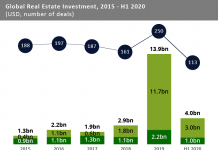Companies based in the United States completed over 400 deals in the sector, more than four times higher than their peers in the United Kingdom
- The United States leads the way in terms of the number of total Real Estate Tech deals, attracting over four times the number of deals as the next country, the United Kingdom. The United States is an established center for innovative tech companies and startups, has a well-developed financial services sector that creates synergies, and has been in a real estate market upswing for the last few years. These factors combined make it a particularly attractive country for investment in this sector.
- The United Kingdom follows in second place, with less than a quarter of the total deals of the United States. Unlike in the United States, where the companies are spread out of several large cities, 96 of the 103 deals in the United Kingdom were completed by companies located in London.
- While three member states of the European Union are present on this list, individual EU states have not become as significant for Real Estate Tech investment as the US and UK. The highest ranked EU state, Germany, has only just over a third of the number of deals as the United Kingdom. The EU as a whole raised 145 deals, meaning it would rank second on this list as a combined entity. When population size is taken into account however, the EU clearly lags behind both the United States and the United Kingdom in terms of Real Estate Tech investment.
- India is the highest ranked country outside of the established markets in North America and Europe. This makes India an interesting outlier in the PropTech space, a sector that is generally associated with developed markets in North America and Europe. Home ownership has been increasing steadily In India over the last few years. Combined with an appreciating local real estate market, and a large, growing population with increasing social mobility, India-based Real Estate FinTechs should benefit from a growing home market for years to come.
New York, London, and San Francisco lead global PropTech investment, while ?Tech Flightboosts Austin prospects
 New York City leads the way globally in terms of the number of Real Estate Tech investments. Due to synergies with the large, established, finance and banking sector, as well as a booming local real estate market and the prevalence of investment properties, New York is likely an attractive location for PropTech companies.
New York City leads the way globally in terms of the number of Real Estate Tech investments. Due to synergies with the large, established, finance and banking sector, as well as a booming local real estate market and the prevalence of investment properties, New York is likely an attractive location for PropTech companies.- Recently, London has gained a reputation as being the FinTech capital of Europe. With a total of 96 deals, London edges San Francisco 95 deals. This is noteworthy since San Francisco is the city that is typically associated with young, high-tech companies. Despite this, it ranks behind the more traditional markets in New York and London in terms of total number of deals. London also has more than three times the total number of deals compared to the next European city, Berlin, which recorded just 22 deals. In fact, the other European cities represented on this list ?? Barcelona, Paris, and Berlin ?? combined have only 65 deals, which is 31 fewer deals than London.
- Another location that will be significant going forward is Austin, TX. Austin is a relatively unknown city to many as it is smaller in size and population than some other cities on this list, and not an established center for business and innovation. While Austin only ranks ninth on this list with a total of 16 deals, Austin will benefit from a ?tech flightout of Silicon Valley and other parts of California, as companies are leaving California due to extremely high operating costs, restrictive local laws, and decreasing quality of life. Austin has embraced this trend by offering economic incentives like tax rebates for companies that move. In fact, when looking only at deals closed in 2021, Austin actually places fifth globally in terms of the number of deals.
Ke.com raised the largest PropTech deal since 2017 helped by huge Chinese residential market
 Ke.com, a Chinese PropTech company that offers a comprehensive online and offline platform for housing transactions and services, is represented twice on this list, raising a total of $2.8bn through two funding rounds. In Q3 2020, Ke.com conducted an IPO on the New York Stock Exchange, adopting the ticker $BEKE. This makes it one of two publicly traded companies on this list, along with Opendoor. The Chinese residential real estate market is one of the largest in the world, valued at approximately $3.5 trillion in terms of gross transaction value, growing at approximately 3% YoY, with around 6.5 times the investment volume of the US market. Ke.com has a market share of 15% in the Chinese housing transactions and services market.
Ke.com, a Chinese PropTech company that offers a comprehensive online and offline platform for housing transactions and services, is represented twice on this list, raising a total of $2.8bn through two funding rounds. In Q3 2020, Ke.com conducted an IPO on the New York Stock Exchange, adopting the ticker $BEKE. This makes it one of two publicly traded companies on this list, along with Opendoor. The Chinese residential real estate market is one of the largest in the world, valued at approximately $3.5 trillion in terms of gross transaction value, growing at approximately 3% YoY, with around 6.5 times the investment volume of the US market. Ke.com has a market share of 15% in the Chinese housing transactions and services market.- The other publicly traded company on this list is Opendoor. Based in San Francisco, Opendoor makes instant cash offers on homes through an online process, performs some improvements on the homes it buys, and then resells them (known as the iBuyer model). Opendoor went public via a merger with one of Chamath Palihaptiya SPACs in Q4 2020. Presently, it trades on the NASDAQ under the ticker $OPEN. SPAC mergers experienced a boom in late 2020 and early 2021 and have become a popular option for early-stage companies to access public markets.
- Another interesting company with that raised a significant amount of funding is Compass. Represented three times on this list, Compass raised a total of $1.2bn between Q4 2017 and Q3 2019. Based in New York, Compass is a real estate platform that simplifies the traditional buying and renting process with a variety of tools, including an online listing site, an app, and by recommending mortgage solutions. Measured by sales volume, Compass is the third largest real estate brokerage in the United States.
- Out of the top ten deals, eight were completed by US companies, further suggesting that the US is the leading country for Real Estate Tech investment. Among US cities, New York is once again dominant with six out of eight US deals.
PropTech Investment in H1 on track for a new annual record, COVID-19 Pandemic only a minor setback
 PropTech investment has been in an uptrend over the last four years. This trend is reflective of the development of the FinTech industry as a whole, and also of the rising asset prices in the real estate market in many areas. Rising asset prices have benefited mortgage companies especially as home buyers are turning towards innovative, tech-based solutions to afford homes.
PropTech investment has been in an uptrend over the last four years. This trend is reflective of the development of the FinTech industry as a whole, and also of the rising asset prices in the real estate market in many areas. Rising asset prices have benefited mortgage companies especially as home buyers are turning towards innovative, tech-based solutions to afford homes.- Total investment increased at a CAGR of 78.4% between 2017 and 2019 as total funding grew from $1.87bn to $5.95bn at the end of the period.
- The COVID-19 pandemic did not have as significant of an impact on PropTech investment as initially expected. The number of deals closed in 2020 was just around 10% less than pre-pandemic levels, as investor confidence rebounded after Q3 2020. Total funding decreased by only 2.7%. While the pandemic was expected to cause a drop in housing prices in the United States, this never materialized with property prices growing above pre-pandemic levels as the economy recovered. This year is also looking like a promising year for PropTech investment at $3.11bn raised across 117 deals in the first six months. This means 2021 is on track to set a new annual record in terms of the number of total deals if this amount of investment persists through the rest of the year.
- The rising market has also created an interest in investing in Real Estate for the masses. The share of retail investors in traditional instruments, such as equities, has been increasing dramatically recently, thanks to discount brokerages such as Robinhood and Webull. This trend has led to the creation of innovative platforms that allow fractional ownership of real estate assets, meaning retail investors can buy shares in investment-grade properties as if they were buying shares in corporations. As even more people become interested in investing and trading, fractional investment platforms will benefit from more users.
- Blockchain technology also has exciting applications for the Real Estate FinTech sector. The Blockchain can be used to digitally record full or partial ownership in properties, which can simplify the traditionally costly, time consuming, and inefficient process of transferring property ownership. Additionally, non-fungible token (NFT) technology can be used to ?tokenizeproperties and allow fully digital transactions with cryptocurrencies. As cryptocurrencies and blockchain technology gain mainstream adoption, the real estate market is also likely to take advantage of these technologies to remove legacy inefficiencies.
The data for this research was taken from the FinTech Global database. More in-depth data and analytics on investments and companies across all FinTech sectors and regions around the world are available to subscribers of FinTech Global. ©2021 FinTech Global


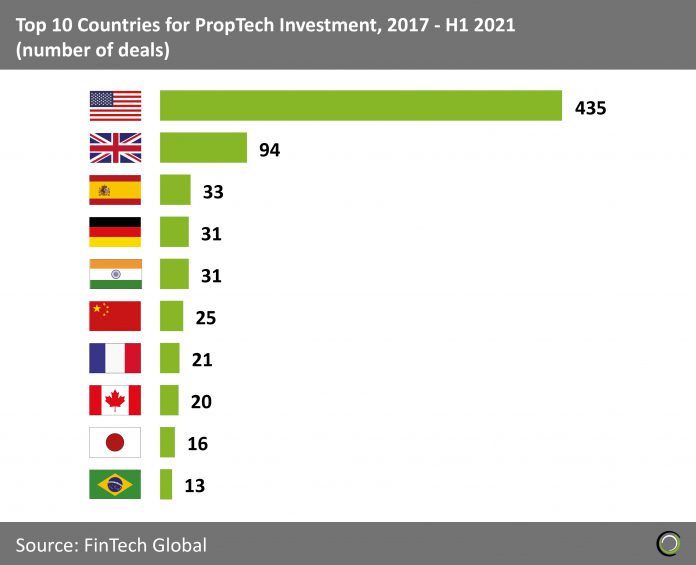
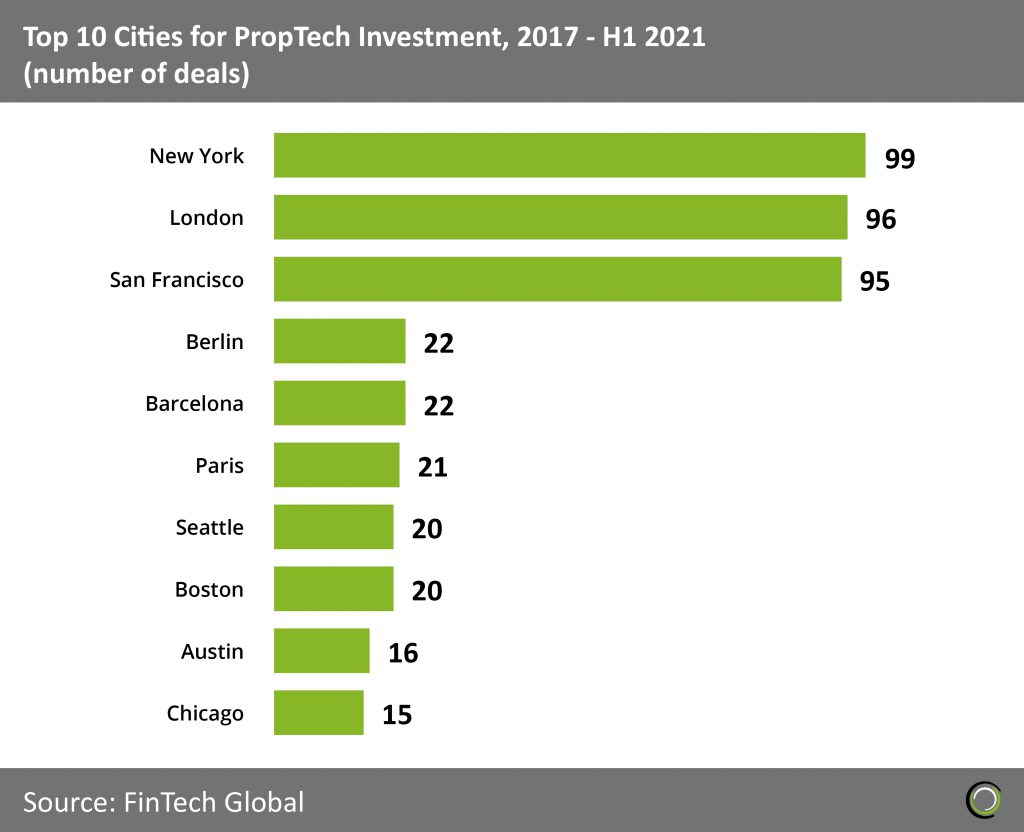 New York City leads the way globally in terms of the number of Real Estate Tech investments. Due to synergies with the large, established, finance and banking sector, as well as a booming local real estate market and the prevalence of investment properties, New York is likely an attractive location for PropTech companies.
New York City leads the way globally in terms of the number of Real Estate Tech investments. Due to synergies with the large, established, finance and banking sector, as well as a booming local real estate market and the prevalence of investment properties, New York is likely an attractive location for PropTech companies.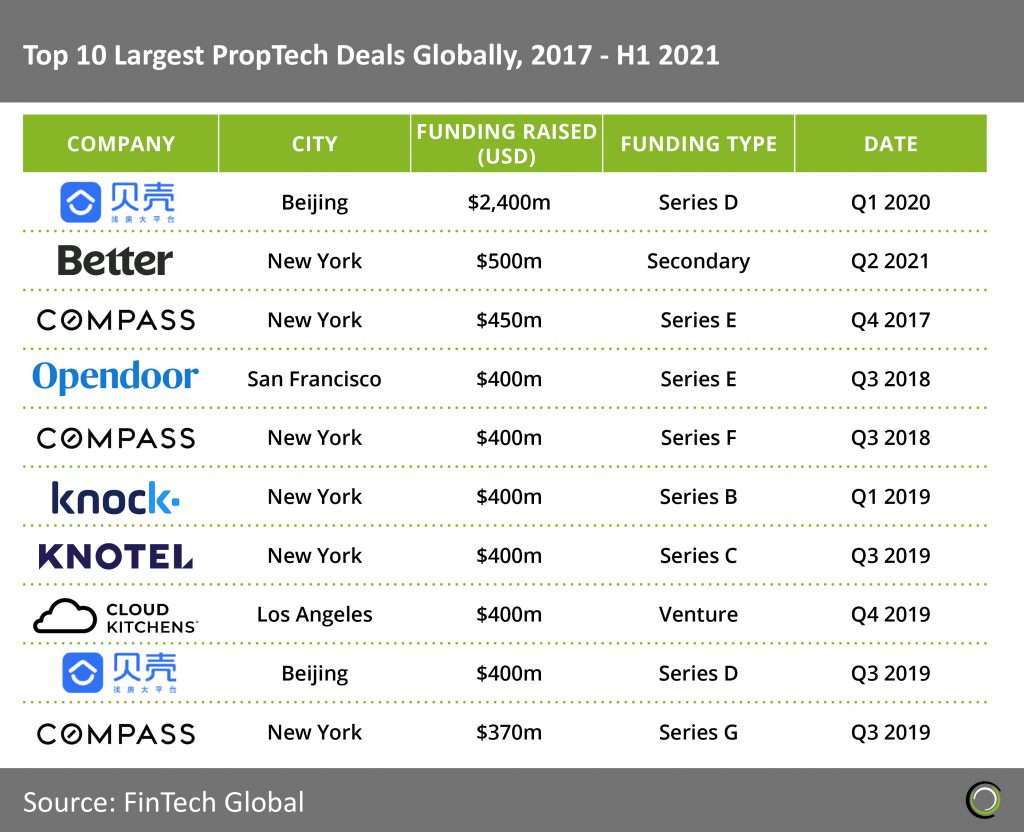 Ke.com, a Chinese PropTech company that offers a comprehensive online and offline platform for housing transactions and services, is represented twice on this list, raising a total of $2.8bn through two funding rounds. In Q3 2020, Ke.com conducted an IPO on the New York Stock Exchange, adopting the ticker $BEKE. This makes it one of two publicly traded companies on this list, along with Opendoor. The Chinese residential real estate market is one of the largest in the world, valued at approximately $3.5 trillion in terms of gross transaction value, growing at approximately 3% YoY, with around 6.5 times the investment volume of the US market. Ke.com has a market share of 15% in the Chinese housing transactions and services market.
Ke.com, a Chinese PropTech company that offers a comprehensive online and offline platform for housing transactions and services, is represented twice on this list, raising a total of $2.8bn through two funding rounds. In Q3 2020, Ke.com conducted an IPO on the New York Stock Exchange, adopting the ticker $BEKE. This makes it one of two publicly traded companies on this list, along with Opendoor. The Chinese residential real estate market is one of the largest in the world, valued at approximately $3.5 trillion in terms of gross transaction value, growing at approximately 3% YoY, with around 6.5 times the investment volume of the US market. Ke.com has a market share of 15% in the Chinese housing transactions and services market.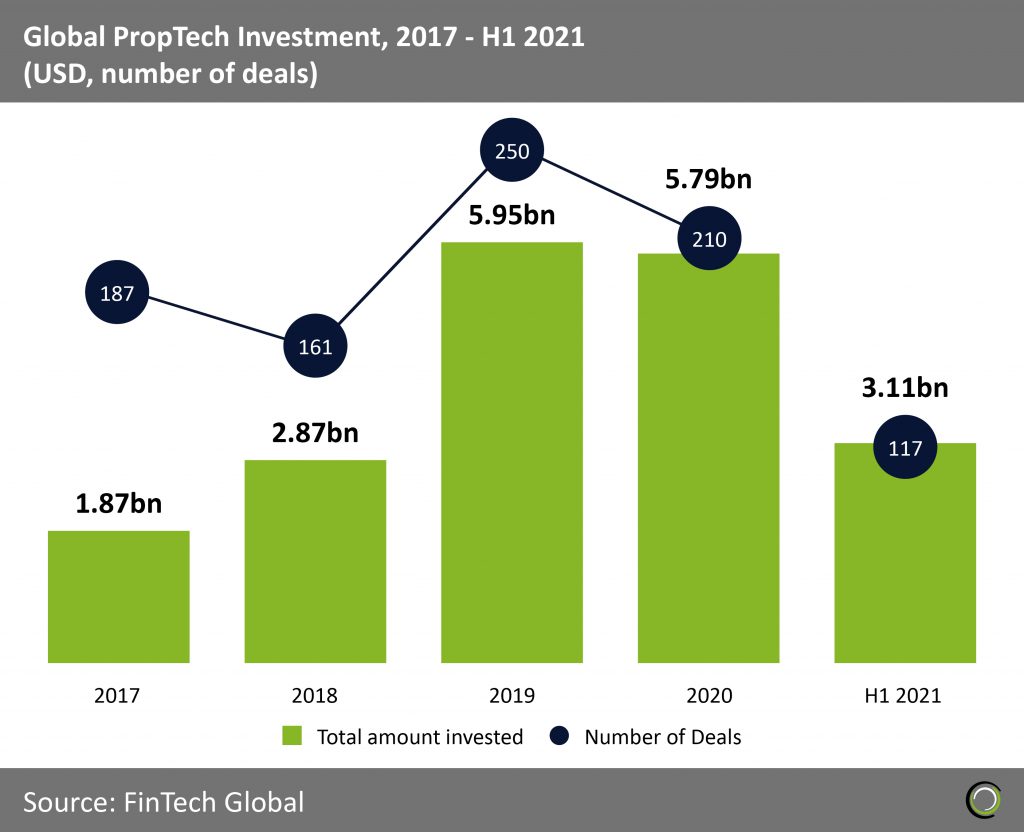 PropTech investment has been in an uptrend over the last four years. This trend is reflective of the development of the FinTech industry as a whole, and also of the rising asset prices in the real estate market in many areas. Rising asset prices have benefited mortgage companies especially as home buyers are turning towards innovative, tech-based solutions to afford homes.
PropTech investment has been in an uptrend over the last four years. This trend is reflective of the development of the FinTech industry as a whole, and also of the rising asset prices in the real estate market in many areas. Rising asset prices have benefited mortgage companies especially as home buyers are turning towards innovative, tech-based solutions to afford homes.



